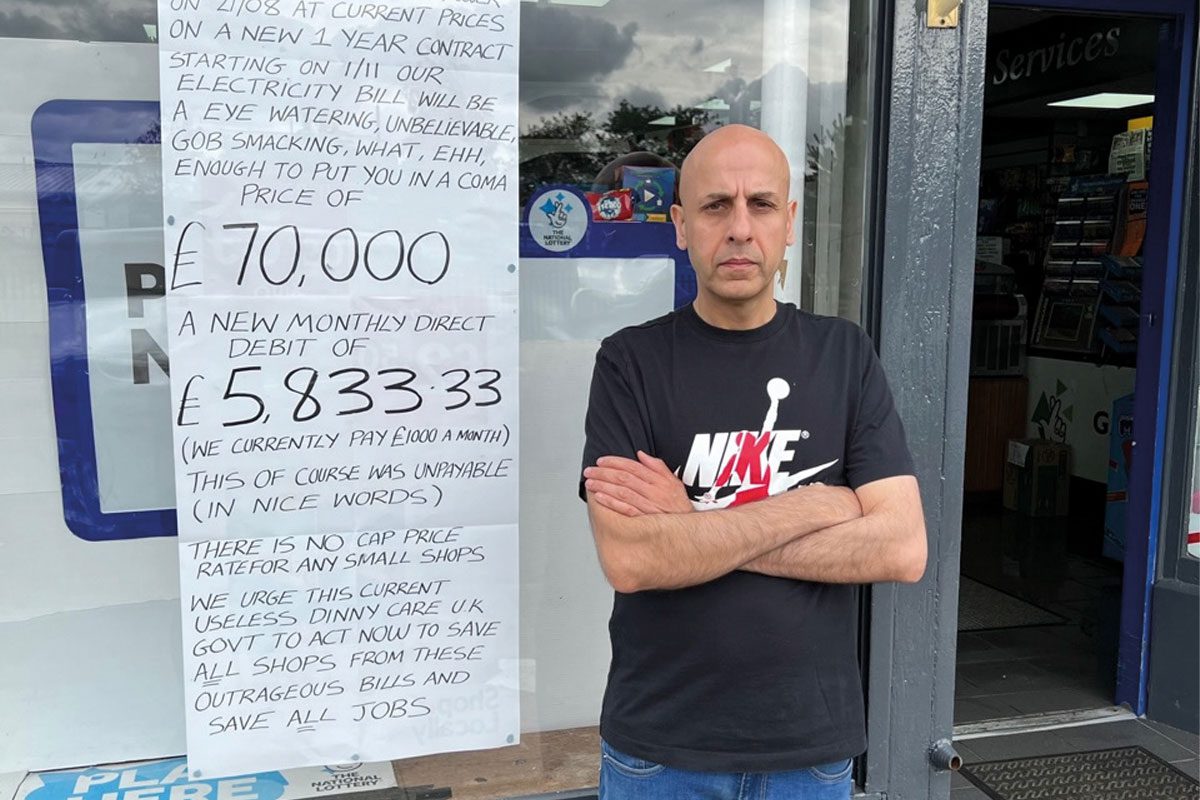Soaring energy costs threaten viable businesses
BUSINESSES will close and jobs will be lost if the government does not act on energy bills, convenience retailers have warned.
Scottish business owners have been sounding the alarm over electricity price hikes, with some expecting five-figure increases to their annual energy bill.
Edinburgh retailer Asif Mohammad, of Fazal and Sons in Moredun, said he will be forced to close if the government does not step in to reduce energy bills, despite trading successfully for 40 years.
“I’m snookered. This is going to cost jobs. People are struggling.”
When Mohammad first got in touch with Scottish Grocer he had eight weeks left on his existing contract, which had seen him pay around £12,000 per year for electricity. He said the new contract offered to him by Scottish Power could leave him with an annual electricity bill in the region of £70,000.
There is no prospect of absorbing a price hike of that magnitude at Mohammad’s store.
“Even if you tried to recoup that off your prices you couldn’t. It’s impossible; nobody is going to buy a can of Coke at £1.50 and 75% of our stock is price marked.
“I personally feel thousands of shops are going to be shut down.”
“People are going to start rioting if prices go up and the government does nothing. No minister is paying attention,” he said.
Over the last month, retailers across Scotland have shared similar stories, with some facing two, three or even fourfold increases to their electric bills this winter.
Representatives from trade associations such as SGF, The Fed and the Association of Convenience Stores all confirmed their members are facing eye-watering increases. And the wait for a new Prime Minister appears to be exacerbating the issue.
Trade associations were in agreement that while they expect an emergency budget in the autumn, their lobbying remains limited until a new Prime Minister and Cabinet are appointed.
A spokesperson for the UK Government said: “No government can control the global factors pushing up the price of energy, but we will continue to support business throughout Scotland and the UK in navigating the months ahead.
“We have already taken a number of steps to support firms, including slashing fuel duty, freezing alcohol duty rates on beer, cider, wine and spirits, and reducing employer national insurance by raising the Employment Allowance, with the Scottish Government also receiving a record £41 billion per year settlement for the next three years.”
A Scottish Government spokesperson said the First Minister has committed to an emergency budget review, “to assess all opportunities to target additional resources to those most in need during this cost of living crisis”.
“Within a limited budget and the restrictions of devolution, the Scottish Government has provided significant support for families and the most vulnerable which will also indirectly support communities and local businesses.
“The Scottish Government supports the calls from businesses for measures related to energy prices, VAT reduction, staff shortages and handling business loans, direct support which falls within the reserved responsibilities of the UK Government.”
A spokesperson for Ofgem – the industry regulator that sets the energy price cap for households but does not have power to limit prices for businesses – advised retailers to contact their supplier if they cannot afford to pay an energy bill.
They said: “Contact your supplier as soon as you can to discuss your options.
“If you live in Scotland and your energy problem is complex or you are in a vulnerable situation, you should contact Advice Direct Scotland on 0808 196 8660.
“Certain charities, such as Business Debt Line, can also be contacted for support in managing debt.”
While retailers wait for the next Prime Minister to take office, Asif Mohammad is running out of patience.
“Nearly every business in the UK – we all face the same problem. It’s ludicrous to ask us to pay this money. My Dad came to this country 60 years ago, only 18, hardly spoke any English. He worked hard all his life, he taught us to keep costs down. ‘When costs are out of control you have no business.’ My dad is right: this is unsustainable,” he said.






















